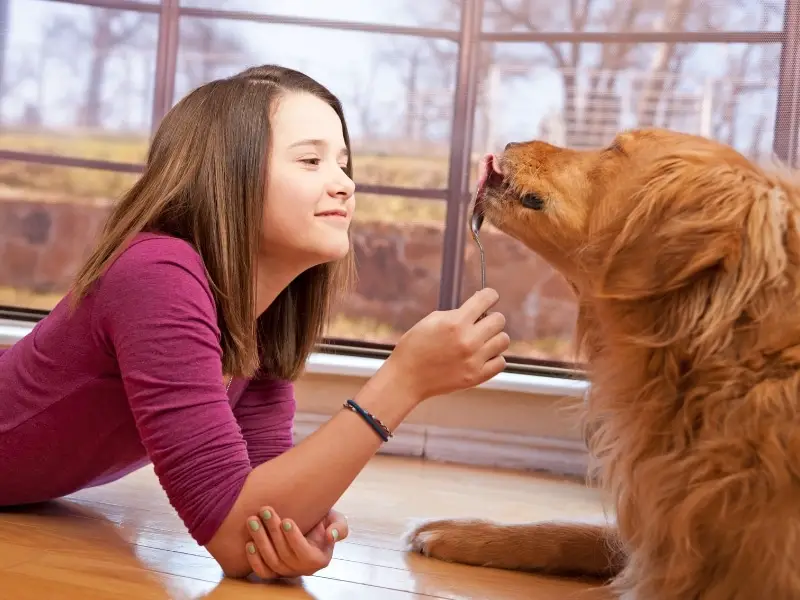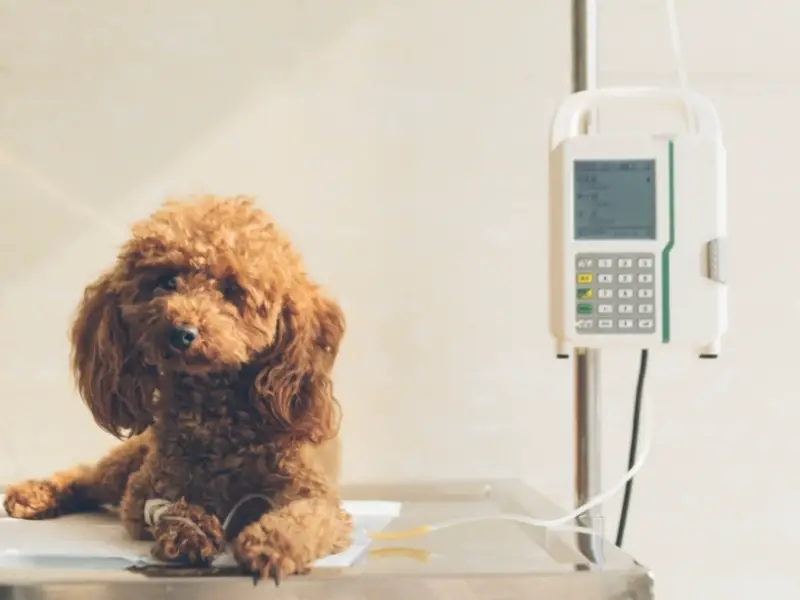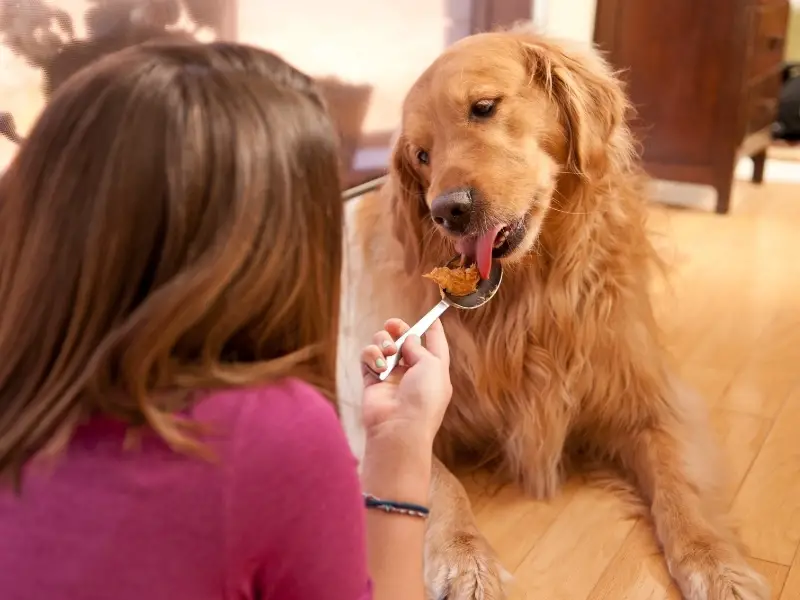If your dog gives you sad puppy eyes every time you open a jar of peanut butter, you aren’t alone. Most dogs love the nutty flavor of peanut butter and would do unimaginable things, like take their medicine or have their nails trimmed, for a single lick.
But, can dogs eat peanut butter? Most peanut butter is safe for dogs to eat in small amounts. As a treat, peanut butter can be a great source of protein, vitamins, and minerals. However, some types of peanut butter, mainly those that contain xylitol, are toxic to dogs. Check the label before feeding peanut butter to dogs.
Stay with us till the end of this article to learn everything you need to know about feeding peanut butter to your dog!
Is Peanut Butter Good for Dogs?
Most peanut butter makes a great occasional treat for dogs and is safe to eat in moderation. This creamy and sticky spread is chock full of protein and essential nutrients your dog needs to stay happy and thrive.
Peanut butter is also a great source of vitamins E, B3, and B6, and it also contains copper, manganese, and magnesium.
While all peanut butter might taste delicious to your pooch, homemade, unsalted peanut butter is always the healthiest option. If, however, you can’t make creamy or crunchy peanut butter at home, look for all-natural peanut butter at the grocery store.
When buying peanut butter for your dog, please read the label carefully, since many brands of peanut butter contain xylitol. This natural sugar substitute causes a rapid decrease in blood sugar levels and is highly toxic to dogs, even when consumed in small amounts.
Benefits of Peanut Butter for Dogs

Peanut butter is loaded with essential nutrients that can be beneficial to your dog and its overall health. Dogs can eat peanut butter as a delicious treat as long as it’s unsalted and sugar-free.
Here are a few benefits of feeding peanut butter to your dog:
1. Peanut Butter Supports Muscle Development
As mentioned above, peanut butter is an awesome source of protein that helps build lean and strong muscles. Just two tablespoons of peanut butter contain 8 g of protein that can keep your dog energized throughout the day and support proper muscle development.
2. Peanut Butter Improves Heart Health
Peanut butter contains omega-6 fatty acids and oleic acid that maintain good cholesterol and blood sugar levels, thus reducing the risk of heart disease. Omega 6 fatty acids also lower bad cholesterol and increase good cholesterol thus promoting optimal blood vessel function.
3. Peanut Butter Promotes Healthy Skin & Coat
Peanut butter is a great source of vitamins B3 and B6 which are involved in many functions within your dog’s body. These vitamins provide beneficial effects on your dog’s skin and coat and are necessary for the growth of the epidermal cells (source).
4. Peanut Butter Is Full of Antioxidants
Peanuts and peanut butter contain coumaric acid, resveratrol, and other powerful antioxidants that can prevent and repair cell damage caused by free radicals. Letting your dog eat peanut butter as a treat can lower the risk of chronic conditions, like heart disease and cancer.
Risks of Feeding Peanut Butter to Dogs

While safe, licking a teaspoon of creamy or crunchy peanut butter can also be risky for your dog’s overall health depending on the type of peanut butter. Don’t forget, some peanut butters are loaded with artificial sweeteners and sodium that can be problematic for dogs.
If you decide to feed your dog peanut butter, these are the risks you should know about:
1. Xylitol
While it’s safe for dogs to eat most types of peanut butter, some brands started adding the artificial sweetener xylitol into their products. Xylitol is a natural sugar substitute that is completely safe for people, but highly toxic to dogs even in small amounts (source).
Ingesting xylitol causes a sudden decrease in a dog’s blood sugar levels which if left untreated can be a life-threatening condition. The good news is, you can easily avoid xylitol poisoning by reading the label of the peanut butter, making sure that there are no artificial sweeteners, including xylitol.
If you suspect that your pooch ingested xylitol, call your vet immediately and observe your dog for signs of poisoning, including seizures, weakness, collapse, and lack of coordination.
2. Excess Fat & Calories
Peanut butter is loaded in fat and calories which when consumed in larger amounts can lead to pancreatitis, a painful inflammation of the pancreas. All that fat and excess calories can also lead to obesity which puts your dog at risk of diabetes, heart disease, and joint problems.
3. Allergies
While dogs rarely develop a life-threatening allergic reaction to peanuts, some dogs might develop symptoms of allergies.
Hair loss, itching, scratching, vomiting, and diarrhea are the most common symptoms of peanut allergy in dogs. If your dog exhibits any of these symptoms after eating peanut butter, contact your vet and stop feeding peanuts to your dog.
4. Aflatoxin Poisoning
Like many other types of nuts, peanuts contain aflatoxins produced by a fungus called Aspergillus. When dogs eat peanut butter made from peanuts that contain these fungi, they can develop aflatoxin poisoning.
Even if you decide to make homemade peanut butter for your dog using a food processor, there is also a risk of aflatoxin poisoning. Call your vet if your pooch experiences any signs of aflatoxin poisoning, including loss of appetite, sluggishness, vomiting, jaundice, and diarrhea (source).
How Much Peanut Butter Can a Dog Eat?
As always, consult your vet before you decide to feed your dog any human foods, including peanut butter. If your veterinarian believes that your pooch can benefit from peanut butter they will tell you exactly how much your dog should eat based on their individual dietary needs.
When it comes to feeding peanut butter to dogs, here are some guidelines you can follow:
- Small dogs – ½ teaspoon of peanut butter
- Medium and large dogs – 1 teaspoon of peanut butter
How to Feed Peanut Butter to Your Dog?
If you decide to feed peanut butter to your pooch, make sure that it’s unsalted and that it doesn’t contain artificial sweeteners and other additives.
Here are some ways you can feed peanut butter to dogs:
- Let your dog lick a teaspoon of peanut butter
- Mix peanut butter with your dog’s food
- Make homemade dog treats using peanut butter, wheat flour, and eggs
- Use peanut butter to stuff your dog’s Kong toy
Conclusion
Full of protein and essential vitamins, peanut butter can be a nutritious treat for dogs when fed in moderation. If you decide to feed peanut butter to your pooch, read the label carefully and make sure that it doesn’t contain xylitol or other additives.
Don’t forget, peanut butter is high in fat and calories, so don’t feed it much or very often to your dog. It’s best that you use peanut butter as a high-value treat for special occasions.
Related Articles:


0 Comments